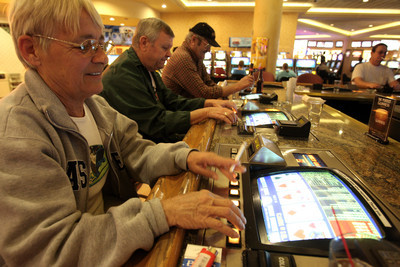An essay by Randall Stross in Sunday's New York Times examines the current state of machine-gambling technology. He cites Kevin A. Harrigan, part of the Gambling Research Team at the University of Waterloo, on the phenomenon of “false wins,” payouts that are less the amount wagered, on multi-line slots. As Stross explains:
In a typical multi-line slot setup, a player can bet on up to 20 different pay lines in a single game. If a player wins on 9 of the 20 lines, resulting in a net loss, the machine still celebrates the occasion with sound and video effects.
Congratulations! You're a loser. Perhaps nothing better captures the affect of consumer capitalism than this idea of a "false win." At the moment of purchase, maybe after waiting in line for a few hours outside an Apple store,
we hear all the bells and whistles advertising and socialization into conusmerism has prepared us for, but only for a moment. We can take to social media to try to extend the noise of celebration, but this is only fleeting at best, even if we are able to capture the attention of any other users, who have their own consumer experiences to desperately broadcast. ("Look at my breakfast. Please! Please!") Once the noise dies down, we realize we are still on the hedonic treadmill, trudging to nowhere.I also love the Latourian wording in Stross's description that depicts the machine as "celebrating," as if it experiences some sort of coercive joy that the human user, fused to the machine in a cyborg assemblage, must then also experience. Indeed, Harrigan tells Stross, "I’m not a gambler myself, but I was playing ‘Money Storm’ in our lab and ‘won’ — nine lines were flashing — and it was cognitively difficult to appreciate that I had actually lost." Wow, just imagine how helpless the degenerate dummies who actually play these machines at their leisure must be in the face of this devious technology!
Paternalism aside, the technology of gaming is extremely sinister. Stross also cites Natasha Dow Schüll, who details in her recent book Addiction by Design (a pdf of the introduction here) how slot-machine technology is optimized for addiction. Schüll argues that familiarity with electronic screens made video "gaming" seem more approachable, unlike table gaming, which requires some social navigation and the mastery of certain protocols and lingo. Privately tapping the screen at a video slot machine allegedly resembles harmless entertainment in a way that shouting cryptic commands at a craps dealer while the chips fly never would. Because the gambling machines are networked in ways table games never could be, the playing conditions they facilitate can be readily manipulated in response to user behavior to enhance the "entertainment" they provide. This makes the gamblers into unwitting test subjects, whose apparently direct confrontation with the whims of fortune is actually carefully manipulated, a manufactured experience.
Schüll notes how Las Vegas has long been regarded as the laboratory of capitalism:
Running alongside the debate over whether Las Vegas is a mirror or a model for America is the question of whether to view the city as a shape-shifting marvel of human inventiveness and technological sophistication or as a dystopic instantiation of consumer capitalism. Whatever its relationship to the culture at large, it is clear that Las Vegas “has become a vast laboratory,” as urban historians Hal Rothman and Mike Davis wrote in 2002, “where giant corporations, themselves changing amalgams of capital from different sectors, are experimenting with every possible combination of entertainment, gaming, mass media, and leisure.” In the Las
Vegas laboratory, machine gambling figures both as a means and an end of experimentation.
The experiment is meant to find the perfect, pure experiential commodity, which, if Schüll is right, turns out to be the nonexperience of playing machines. The machines are designed to expedite the speed of wagering, to provide a steady stream of bet-resolutions that seem to hinge on choices the user made but in reality are random. "Some machines allow players to choose the exact moment when the reels stop spinning, but a sense of control is illusory," Stross writes. "The outcome is determined when the reels start spinning and has absolutely nothing to do with what the player does or does not do."
The helplessness we experience in the face of modernity's "expert systems" upon which we inevitably rely, as well as the relentless celebration of consumer choice as the highest expression of freedom, leads us to a willingness to consume a parody of choice in the form of slot machines. What can be more redolent of freedom than choosing to choose choice, over and over? Moments of having our fate decided masquerade as moments of decision, and the machines are designed to remove any friction between those moments, which might give a player an opportunity to consider the only decision that really does have an impact on gaming outcomes: whether or not to continue playing. So slot players consume speed as a form of ersatz decision making; momentum substitutes itself for rational choice. Consuming speed as such offers the illusion of mastering risk by plummeting right past it.
In the last section of America, Baudrillard offers this gnomic definition of gambling:
Gambling itself is a desert form, inhuman, uncultured, initiatory, a challenge to the natural economy of value, a crazed activity on the fringes of exchange. But it too has a strict limit and stops abruptly; its boundaries are exact, its passion knows no confusion.
I take that to mean that gambling is rationalized irrationality — that it is more rational than rational, to ape one of Baudrillard's trademark phrasings. Gambling is where consumerism transcends the banal pursuit of a fair exchange without transcending capitalism altogether. Baudrillard suggests that
Death Valley and Las Vegas are inseparable; you have to accept everything at once, an unchanging timelessness and the wildest instantaneity. There is a mysterious affinity between the sterility of wide open spaces and that of gambling, between the sterility of speed and that of expenditure.
It seems to me that Baudrillard is evoking, in his inscrutable fashion, the same idea that the gamblers Schüll interviewed for her book described: the quiet calm in the midst of the most frenetic gambling, the flattening of time into a featureless expanse by the relentless pace of the machine. The details of the money lost or won, the details of the game being played, don't matter. As Stross notes, the machines provide the "most immersive, distraction-free gambling experience," which ushers users into what Schüll, following a gambler named Mollie she interviewed, calls "the machine zone":
Why, then, does she play? “To keep playing — to stay in that machine zone where nothing else matters.” I ask Mollie to describe the machine zone. She looks out the window at the colorful movement of lights, her fingers playing on the tabletop between us. “It’s like being in the eye of a storm, is how I’d describe it. Your vision is clear on the machine in front of you but the whole world is spinning around you, and you can’t really hear anything. You aren’t really there — you’re with the machine and that’s all you’re with.”
Sounds terrible, right? What an addict. Or maybe not. Given the intensity of focus and the clarity of purpose she describes, it sounds a lot like being in the "zone" in the Michael Jordan sense — where decisions are automatic and feel intuitively right — or what Mihaly Csikszentmihalyi describes in Flow (1990) as "optimal experience":
We have all experienced times when, instead of being buffeted by anonymous forces, we do feel in control of our actions, masters of our own fate. On the rare occasions that it happens, we feel a sense of exhilaration, a deep sense of enjoyment that is long cherished and that becomes a landmark in memory for what life should be like. This is what we mean by optimal experience.
It seems counterintuitive to regard slot-machine players as masters of their own fate, but what they are doing is choosing to confront the inescapability of fate on their own terms, to select the terms of engagement ("this Megabucks machine, in this 7-11"), which may be the only choice we have.
What machine gaming suggests is that optimal experience can be commodified, then purchased instead of earned, as Csikszentmihalyi insists it must be. It turns out that what "life should be like" can be an empty simulacrum of the satisfaction derived from mastery, a dilettantism pursued through shortcuts and through meaningless choices regarding random outcomes that are arbitrarily invested with significance. Gambling is one way of giving empty choices meaning. Fashion is another.
Csikszentmihalyi writes that flow states stem from "when a person's body or mind is stretched to its limits in a voluntary effort to accomplish something difficult and worthwhile." Optimal experiences "add up to a sense of mastery—or perhaps better a sense of participation in determining the content of life," he adds."Only direct control of experience, the ability to derive moment-by-moment enjoyment from everything we do, can overcome the obstacles to fulfillment."
Logging 15 hours on a video-poker machine is probably not most people's idea of "difficult and worthwhile," though maybe we shouldn't judge. It's as moment-to-moment as enjoyment gets. We're prone to label such extremity "addiction" rather than "participation" because the social worth in it is hard to fathom (though if you like capitalism, you should like the support such behavior gives to its corporations). Gambling machines simulate the ideal of "direct control" and they accelerate users beyond the point of conscious risk assessment into the experience of pure stimulus response. How many repetitions does Malcolm Gladwell say we need before we achieve genius?
Gambling teaches that "optimal experience" as a reward for diligent practicing is just a lie; actually, it's just another experiential good for sale — maybe the ultimate one, as Schüll suggests. Nothing prevents dilettantes (or addicts) from having optimal experience, from being in the flow. Mastery and "meaningfulness" — or at least socially sanctioned "meaningfulness" — is not inherent in the experience of flow, despite what Csikszentmihalyi seems to suggest in promoting flow as an end in itself. Flow is just the escapism of control fantasies, imposed on the experience of losing control of our ability to shift our focus anywhere else.

